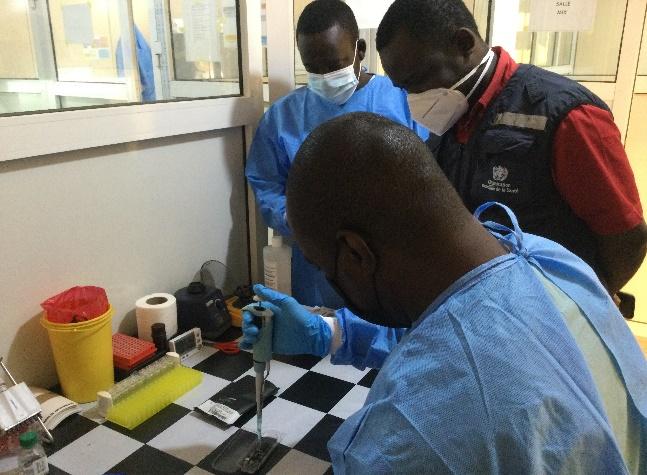
- Report -

Ukraine
Making every school a health-promoting school: global standards and indicators
author




- Improved access to quality essential health services irrespective of gender, age or disability status
- Countries enabled to provide high-quality, people-centred health services, based on primary health care strategies and comprehensive essential service packages
- Health emergencies rapidly detected and responded to
Capacity building for SARS-CoV-2 variant detection
Genomic sequencing plays a critical role in responding effectively to the COVID-19 pandemic as it enables an informed response to be made to COVID-19. However, during the initial phases of the outbreak in Chad, the country faced various resource-related challenges, including the absence of a microorganism sequencing platform and appropriate technical infrastructure for molecular diagnostics. This limited Chad's capacity to detect and respond to the virus effectively. To identify virus variants during the first two waves of the pandemic, Chad relied on the World Health Organization’s (WHO’s) genomic surveillance network, which involved shipping SARS-CoV-2 samples to the National Institute of Biomedical Research (INRB) in Kinshasa, Democratic Republic of the Congo (DRC). This process was costly and resulted in delays in receiving results. To address these issues, WHO Chad collaborated with the government of Chad to invest in infrastructure and personnel. Consequently, in April 2022, Chad launched its local sequencing platform, enabling prompt detection and response to health emergencies, real-time tracking of the virus during epidemiological waves and enhancement of the country’s overall ability to respond to public health crises [1–4].
Key WHO Contributions
-
Enabling genomic sequencing of SARS-CoV-2 samples through WHO’s genomic sequencing surveillance network
-
Organizing a South-South exchange programme and financing a companionship mission for training and support
-
Assessing infrastructural needs and providing direct financial support for the expansion of the laboratory site for sequencing
-
Funding and procuring two sequencers (MinION and GridION) and related equipment, consumables and reagents for sequencing
-
Conducting an expert mission to assess Chad's genomic surveillance capacities and providing tailored support for further improvement.
How did Chad, with the support of the WHO Secretariat, achieve this?
To enhance Chad's human resource capacity to sequence microorganisms and carry out molecular diagnostics, WHO facilitated South-South cooperation between Chad and the DRC. In October 2021, WHO Chad organized an exchange programme with the DRC, whereby three lab technicians attended a three-week internship at the INRB in Kinshasa. During the programme, the technicians received training on using the MinION sequencer model, an Oxford Nanopore technology. In February 2022, WHO Chad financed a companionship mission, whereby two INRB experts, a microbiologist, and a bioinformatician, brought a MinION sequencer model to Chad and conducted training sessions at Ndjamena.
"Cooperation between our two institutions on the SARS-CoV-2 sequencing platform initiative has been unprecedented, unique and highly successful. We look forward to exploring other laboratory areas where we could continue this particularly successful experiment together”
-Dr Abdmadjid Abderahim Mahamat, Minister of Public Health and Prevention, Chad

The INRB team coaches the local team to conduct sequencing analysis.
Photo credit: Zongo Frank Edgard, WHO Chad.
Following the internship programme, in February 2022, the WHO Chad laboratory focal point and the sequencing focal point of the Ministry of Health (MoH), along with one of the three laboratory technicians who completed internship at the INRB, collaborated to evaluate the infrastructure at the Laboratory of Biosafety and Epidemics, designed for sequencing in Chad. Their assessment revealed that the available rooms for molecular biology were not suitable for sequencing, and they recommended an extension. In response to the findings, WHO provided direct financial support for expansion of the laboratory site in March 2022 by constructing a new room specifically dedicated to sequencing and compliant with the required standards.
In April 2022, Chad's local sequencing platform was launched, utilizing the sequencer provided by the INRB team. The platform analysed 15 positive samples from the third wave of COVID-19 in the first quarter of 2022, detecting 12 sequences, of which 10 were of the highly transmissible Omicron variant, including subvariants B.1.1.529, BA.1, BA.2, and BA.3. The remaining two sequences were identified as B.1 and Recombinant XJ. Samples from the same wave of the epidemic were also sent to the INRB, which also found a high prevalence of the Omicron variant, providing additional evidence for its involvement in the occurrence of the third wave of COVID-19 in Chad.
In September 2023, WHO Chad funded and procured two sequencers (MinION and GridION) along with related equipment, consumables and reagents, for sequencing of at least 600 samples using Oxford Nanopore technology. The procurement process was carried out by the WHO headquarters' procurement team, and the equipment delivered to Chad's national sequencing laboratory, LaBiEp, by the WHO Country Office.
“This laboratory technology is new to Chad, and is the result of successful South-South cooperation between the Biomedical Research Institute in Kinshasa in the Democratic Republic of Congo, and the Laboratory of Biosafety and Epidemics (LaBiEp) in Chad. Given its clear benefits, this South-South cooperation should be encouraged in other areas of public health”.
-Dr J.B. Ndihokubwayo, WHO Representative in Chad
Chad’s successful collaboration with the DRC, facilitated by WHO, highlights the critical role of international cooperation in strengthening global health systems and emphasizes the importance of investing in genomic surveillance capabilities to effectively address public health emergencies. While laboratory technicians in Chad now have the necessary training, infrastructure, equipment, materials, reagents and protocols to perform sequencing of SARS-CoV-2 and other pathogenic microorganisms, mastering genomic surveillance techniques will require more time. The next steps to build genomic surveillance capacity in Chad will include long-term training for one or two technicians and developing a national protocol for genomic surveillance to enable representative sampling. WHO is conducting an expert mission to assess Chad’s genomic surveillance capacities, with the goal of identifying areas that require further improvement and providing tailored support to strengthen the country’s overall capacity to respond to public health crises.
References
- Zongo RFE, Mathieu H, Uwimbabazi JC, Mahamat OO, Ndihokubwayo JB. La surveillance génomique du SARS-COV2 au Tchad : stratégie de mise en place et modèle de coopération Sud-Sud. Bulletin d’information du bureau Pays OMS au Tchad. Santé-Info Tchad 2022: 4.
- Rapport annuel 2021 de l’ONU au Tchad [United Nations 2021 annual report on Chad: in French]. New York: United Nations; 2022 ( https://minio.dev.devqube.io/uninfo-production-main/fab8ffd1-9e4f-48b7-aea5-c398bea1b874_Rapport_annuel_2021_Final.pdf, accessed 12 March 2023).
- World Health Organization. Brazzaville: WHO African Region; 2022 [news item in French, 6 August 2022 (https://www.afro.who.int/fr/countries/chad/news/renforcement-des-capacites-de-surveillance-genomique-au-tchad-loms-remet-un-laboratoire-de, accessed 12 March 2023).
- African Manager. Tunis: African Manager, 2022 [newspaper article in French, 29 March 2022] (https://africanmanager.com/un-laboratoire-kenyan-renforce-la-surveillance-du-genome-du-covid-en-afrique/, accessed 12 March 2023).
- Improved access to quality essential health services irrespective of gender, age or disability status
- Countries enabled to provide high-quality, people-centred health services, based on primary health care strategies and comprehensive essential service packages
